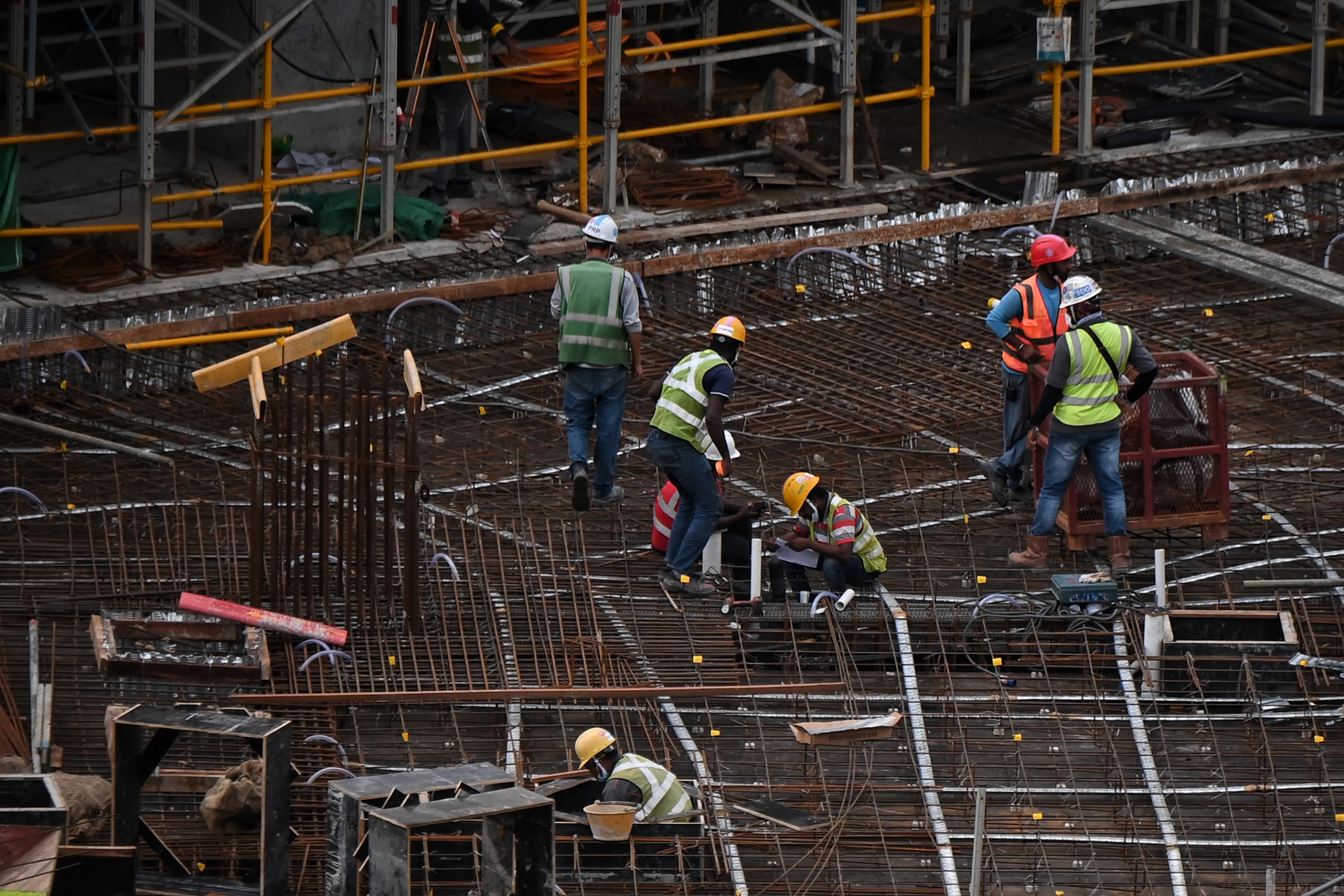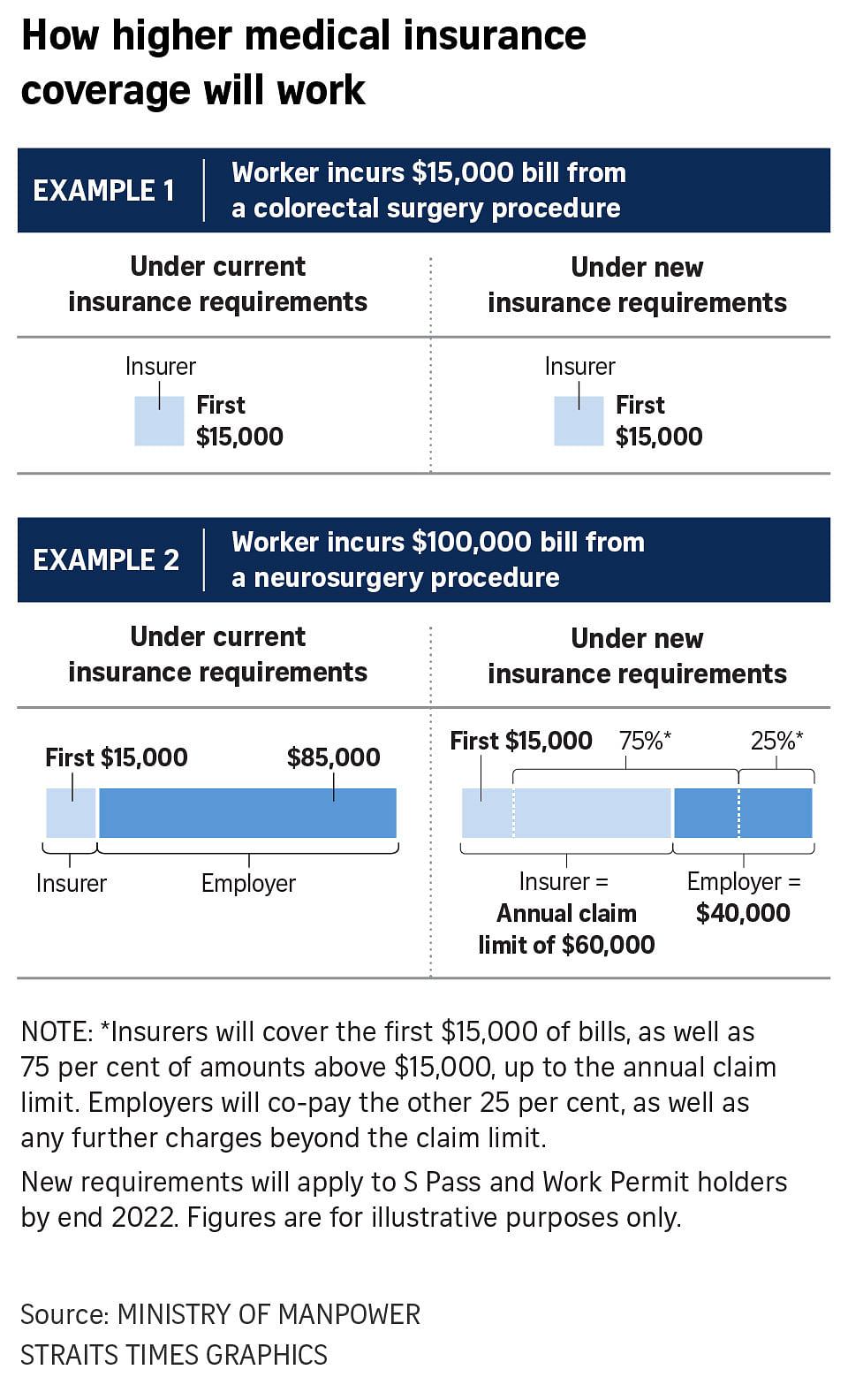Budget debate: Employers must buy higher medical insurance coverage for maids, migrant workers
Sign up now: Get ST's newsletters delivered to your inbox

Employers of migrant workers must buy plans with a minimum annual claim limit of $60,000.
ST PHOTO: KUA CHEE SIONG
Follow topic:
SINGAPORE - Employers of maids and other migrant workers on work permits and S Passes will soon need to buy higher medical insurance coverage for their employees.
They must buy plans with a minimum annual claim limit of $60,000 for hospitalisation and surgical procedures, up from $15,000 now.
But they will no longer need to pay for their workers' medical treatment upfront and claim the amount from insurers later, as insurers will be required to reimburse claims for inpatient and day surgery bills directly to hospitals, said Senior Minister of State for Manpower Koh Poh Koon on Friday (March 4).
"This will help employers who are cash-strapped, and free up cash flow for businesses and help families having migrant domestic workers," said Dr Koh, during the debate on his ministry's budget.
The changes will take effect by the end of this year for all new applications and renewals of work permits and S Passes. More details will be provided later on, said the Ministry of Manpower in a press release on Friday (March 4).
Employers are legally responsible for the cost of medical treatment for migrant workers.
Dr Koh said the higher minimum coverage will provide employers greater peace of mind in financing their workers' bills, as migrant workers do not enjoy subsidies for medical bills, unlike locals, and medical costs are expected to increase over time.
As it is, an average of more than 1,000 employers of migrant workers a year face bills larger than $15,000, he said.
With the higher coverage requirement, insurers will still cover the first $15,000 of bills, as well as 75 per cent of amounts above $15,000, up to the annual claim limit.
Employers will co-pay the other 25 per cent, as well as any further charges beyond the claim limit.
For example, for a bill of $100,000, the employer currently would have to pay $85,000 under a plan with an annual claim limit of $15,000.
But with the new requirements, the insurer would cover the first $15,000 as well as 75 per cent of the remaining bill, up to the annual claim limit. In this case, that would be $45,000 under a plan with a claim limit of $60,000. The employer would thus pay $40,000.
The claim limit may vary for different plans, but must be at least $60,000.

The Straits Times reported last December that the ministry was considering raising the minimum annual claim limit to $60,000 or $100,000.
Dr Koh also announced some measures aimed at keeping premiums affordable.
There will be a standardised list of baseline allowable exclusions across insurers, such as procedures that are not medically necessary, like cosmetic surgery, treatment of injuries arising from any malicious acts by the employer or his family members, and treatments for pre-existing illnesses occurring within the first 12 months of work under the same employer.
Insurers must also offer different premiums for workers aged 50 and below - they make up 95 per cent of all migrant workers and migrant domestic workers - and those above the age of 50.
"The enhancements have been carefully calibrated to provide better support for businesses and MDW (migrant domestic worker) employers in managing large medical bills while keeping premiums affordable," said Dr Koh.
Some migrant worker insurance plans in the market already provide higher coverage than is required.
For example, an FWD "essential" plan covering $15,000 of hospitalisation and surgical expenses a year has a premium of about $335, while an "exclusive" plan with $25,000 coverage has a premium of about $500.

PHOTO: ST FILE
As at June last year, there were about 834,300 work permit holders - of whom 245,600 were maids - and 164,200 S Pass holders working here.
Providing updates on other aspects of migrant worker health, Dr Koh said 99.4 per cent of those living in dormitories are fully vaccinated as at Feb 20.
Close to 600 front-line officers have been trained in basic psychological first aid and more than 200 migrant worker peer leaders have been trained in self-care and peer support to help detect signs of distress more quickly and link those who need help with counselling services and support helplines in their native languages.
To date, more than 55,000 workers have gone through onboard centres. These were started in March last year for migrant workers entering Singapore to serve their stay-home notice, complete a medical examination, and undergo a residential settling-in programme and vaccination if required, all under one roof.
The Government is also continuing to work on improving housing standards for migrant workers, and enhancing their social well-being and recreational needs, said Dr Koh.
For example, it is working with non-governmental organisations to make recreation centres livelier, with retail bazaars, and sports and cooking competitions.
It is also prepared to adjust the quota for vaccinated workers to leave their dormitories and visit public places as the Covid-19 situation improves. The visit slots are not fully utilised today, noted Dr Koh.
"The Covid-19 pandemic has been a challenging time for everyone, not least for our migrant workers. They have shown remarkable resilience during the Covid-19 pandemic," he said.

